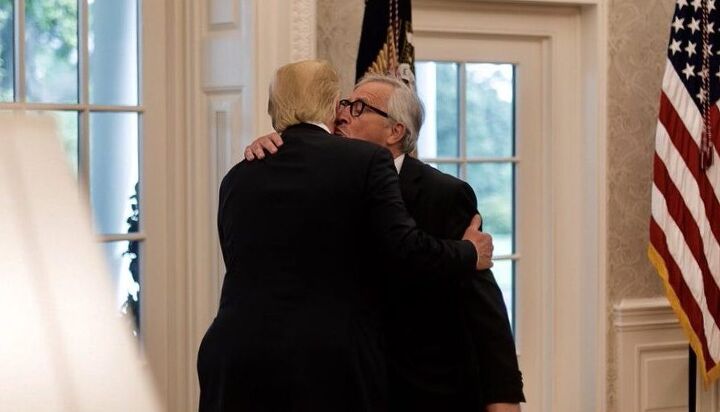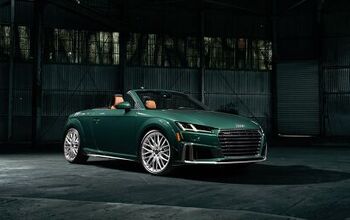Trade War Watch: Trump Reportedly Delaying Auto Tariffs, Clock Still Ticking

The Trump administration was supposed to make an announcement Tuesday as to whether or not imported automobiles pose a national security risk, following discussions with trade representatives. While it wasn’t presumed that the White House would say anything truly definitive or hold a formal press conference on the issue, it was assumed that the president would take a stronger public stance either for or against an earlier proposal to raise foreign auto import tariffs to 25 percent. And it has, in a way.
According to those familiar with the matter, the White House decided to postpone any major decisions after discussing a draft Commerce Department report on the impact of auto imports with trade reps. However, the administration doesn’t have forever to make up its mind. Nor does its trading partners, which could be the point.
The investigation, which began in May under section 232 of the Trade Expansion Act, covers all imported passenger vehicles as well as auto parts. Commerce Secretary Wilbur Ross has until February to deliver his completed report to the president, who will then have an additional 90 days to make a final decision and another 15 to begin moving forward.
Unfortunately, the report remains closely guarded, so the Commerce Department’s current recommendations are a complete mystery. Most analysts believe it will recommend against unilateral tariffs but for some level of protectionism against specific countries posing an economic threat — specifically China, which imposes exceptionally high auto tariffs against the U.S. already.
At the very least, we know the administration is taking the matter seriously. According to Bloomberg, officials present for Tuesday’s meeting at the White House included Ross, Treasury Secretary Steven Mnuchin, U.S. Trade Representative Robert Lighthizer, National Economic Council Director Larry Kudlow, and Senior Adviser Jared Kushner. The discussion was said to take up the majority of the day. Lighthizer was also scheduled to meet with the EU’s trade commissioner, Cecilia Malmstrom, on Wednesday.
Malmstrom said Europe expects it will not be subject to any new U.S. auto tariffs, at least not until it has had time to talk things over with the United States. “We are under the assumption that is still valid,” she said, referencing a summer agreement not to hit each other with anymore impromptu import duties — an event capped off by a kiss between the president and European Commission chief Jean-Claude Juncker (pictured).
Trump wants a formal trade agreement with Europe and revised deals made with other major trading partners in the hopes of setting America up for a better future. We’ve long suspected that the tariff threat may simply be a bargaining chip to bring nations to the table, ready to make concessions. Perhaps the postponement is part of that. However, it still only gives the United States’ trading partners until May of next year to construct a formal trade agreement that encompasses more than just automobiles.
The White House still appears ready to move forward with the tariff plan and isn’t beholden to the Commerce Department’s recommendations — even though it’ll likely help decide any future trade rules. Meanwhile, most automakers continue to express serious concerns that a 25 import fee could upend the industry and drive up the price of every vehicle in production by a sizable margin.
[Image: White House]

A staunch consumer advocate tracking industry trends and regulation. Before joining TTAC, Matt spent a decade working for marketing and research firms based in NYC. Clients included several of the world’s largest automakers, global tire brands, and aftermarket part suppliers. Dissatisfied with the corporate world and resentful of having to wear suits everyday, he pivoted to writing about cars. Since then, that man has become an ardent supporter of the right-to-repair movement, been interviewed on the auto industry by national radio broadcasts, driven more rental cars than anyone ever should, participated in amateur rallying events, and received the requisite minimum training as sanctioned by the SCCA. Handy with a wrench, Matt grew up surrounded by Detroit auto workers and managed to get a pizza delivery job before he was legally eligible. He later found himself driving box trucks through Manhattan, guaranteeing future sympathy for actual truckers. He continues to conduct research pertaining to the automotive sector as an independent contractor and has since moved back to his native Michigan, closer to where the cars are born. A contrarian, Matt claims to prefer understeer — stating that front and all-wheel drive vehicles cater best to his driving style.
More by Matt Posky
Latest Car Reviews
Read moreLatest Product Reviews
Read moreRecent Comments
- Tassos Jong-iL North Korea is saving pokemon cards and amibos to buy GM in 10 years, we hope.
- Formula m Same as Ford, withholding billions in development because they want to rearrange the furniture.
- EV-Guy I would care more about the Detroit downtown core. Who else would possibly be able to occupy this space? GM bought this complex - correct? If they can't fill it, how do they find tenants that can? Is the plan to just tear it down and sell to developers?
- EBFlex Demand is so high for EVs they are having to lay people off. Layoffs are the ultimate sign of an rapidly expanding market.
- Thomas I thought about buying an EV, but the more I learned about them, the less I wanted one. Maybe I'll reconsider in 5 or 10 years if technology improves. I don't think EVs are good enough yet for my use case. Pricing and infrastructure needs to improve too.


































Comments
Join the conversation
I'd like to see the Bolt in Oz but selling American cars overseas requires more than just good cars. For a start, until recently the big 3 owned subsidiaries all over the world to make cars for their local folk so export was not required. (see Holden, Opel, Daewoo, Jaguar, Saab, chunks of Mazda etc). Recent selloffs may have changed the game. Secondly, the U.S. manufacturers, unlike their European or Asian competitors make very few cars that can be assembled both LHD and RHD. Before you dismiss us as 'driving on the wrong side' they are ignoring about 1/3 of the world including countries like Australia and South Africa which have similar requirements of a car as the U.S.
Yup, Trump has already had a negative effect on US vehicle exporters. So much for Trump's great business and negotiating skills. Read below; "Consider the case of German carmaker BMW AG. Its plant in Spartanburg, S.C., which makes X3 and X5 SUVs, is one of its biggest in the world and has been a major source of U.S. auto exports to China. Yet, starting this year, the carmaker also began building the X3 in China to avoid the 40 percent duties Beijing now charges on American-made autos. In July it detailed plans for an expanded joint venture with Brilliance China Automotive Holdings Ltd. that will make the country an export hub for the electric version of the X3 when it enters production in 2020." Yeah, MAGA! https://www.bloomberg.com/news/features/2018-11-15/the-u-s-is-playing-catch-up-with-rivals-as-globalization-marches-on?srnd=premium-asia